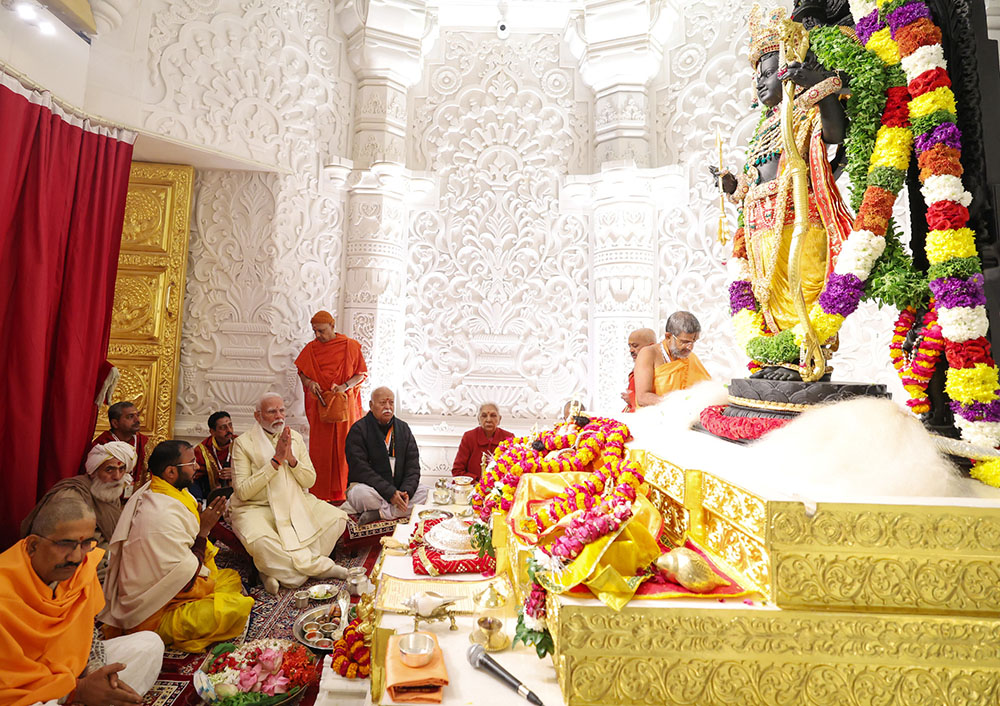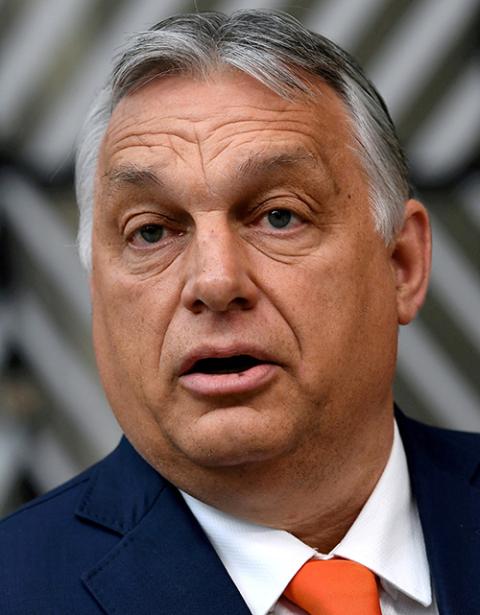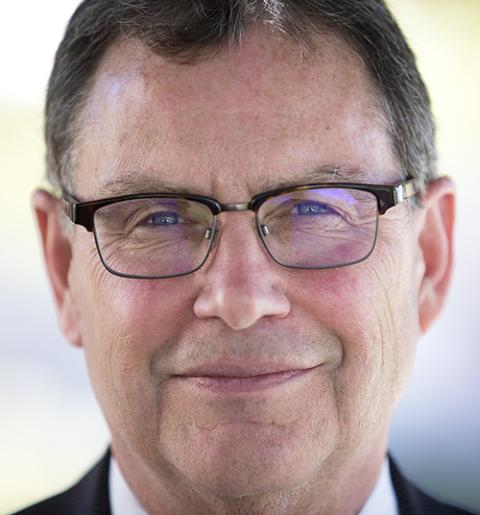
Indian Prime Minister Narendra Modi, in white, prays during the dedication of a large Hindu shrine in the city of Ayodhya Jan. 22. It was built on top of the ruins of a 16th-century mosque that was destroyed by Hindu mobs in 1992. (Wikimedia Commons/Government of India)
Professor Stephen Schneck delivered the annual Alan Wolfe lecture at Boston College's Boisi Center on Feb. 6 on the topic "Religious Nationalism and the Dimming of Religious Liberty." Schneck, who taught politics for many years at the Catholic University of America, was appointed to the U.S. Commission on International Religious Liberty by President Joseph Biden in 2022, although he made clear he was not speaking in an official capacity, but as a scholar among scholars.
Full disclosure: I worked with Schneck at the Institute for Policy Research and Catholic Studies for many years and consider him one of my dearest friends. That has never prevented me from telling him when he is wrong, or him from telling me when I am wrong!
Schneck began with a shout-out to Dignitatis Humanae, the Second Vatican Council's Decree on Religious Liberty, which celebrates its 60th birthday next year. He noted that many theologians focus on how the document led to the Lefebvrist schism, and others its impact on ecumenism.
However, he hoped for greater focus on "the extraordinary importance of Dignitatis for reconciling Catholic theology with modernity's democratic political order based on liberalism's rights and liberty. In the way that Dignitatis addresses freedom of conscience and belief, it is a toolkit for building out a theory of liberal democracy from Catholic teachings — or at the very least it may provide elements of a Catholic apology for liberalism."
Looking at the manner in which too many Catholics in this country are willing to look the other way while liberalism is attacked from both left and right, one can hope theologians will take up Schneck's invitation.
The bulk of Schneck's talk looked at what happens when liberalism and its conception of religious liberty are abandoned. In his work at the Commission on International Religious Liberty, he said, "it's been my responsibility to bear witness to a global epidemic of violence, persecution and calculated discrimination directed at people because of what they believe — or don't believe."
From meeting with victims to being surveilled to being blacklisted from certain countries, Schneck recounted the experience of religious liberty's absence. His account of visiting refugee camps for those fleeing religious persecution in Myanmar was both distressing and moving.
India and Hungary were the two countries Schneck discussed in detail. Last month, Indian Prime Minister Narendra Modi celebrated the dedication of a large Hindu shrine in the city of Ayodhya. It was built on top of the ruins of a 16th-century mosque that was destroyed by Hindu mobs in 1992.
Advertisement
Modi's political party, the Bharatiya Janata Party, rose from its small, extremist roots to the majority party out of the same ruins as the new temple.
"In India, the government at the national, state and local levels employs religiously discriminatory policies, including laws targeting religious conversion, interfaith relationships, the wearing of hijabs, and cow slaughter, which negatively impact non-Hindu religions," Schneck explained. "This includes Muslims, Christians, Sikhs, Dalits, Jains, Parsis, Buddhists and Indigenous peoples and tribes. The government also censors critics of Hindu nationalism by surveillance, harassment, demolition of property, and detention and targets both domestic and international civil society organizations with interests in freedom of religion and belief."
Schneck described the rise of religious nationalism in India as a three-step process:
1. Old extremist religious biases among fringe groups; 2. kindled and normalized by a charismatic leader; and 3. advancing a political agenda that imperils liberalism's human rights in general.
Those steps can be rearranged, however, by others seeking to gain or consolidate political power and, in Hungary, that is precisely what happened.

Hungarian Prime Minister Viktor Orbán during the European Union summit in Brussels June 24, 2021 (CNS/Reuters/John Thys, pool)
A combination of factors, from the migration crisis to suspicion of secular Western elites to high youth unemployment, brought right-wing nationalist Viktor Orbán to power in 2010, but he did not start by invoking religious ideals. Orbán's appeal was more racist and populist than religious, in part because Hungary has some of the lowest church attendance numbers in Europe. Its historic antisemitism was considered just that, historic.
Christian identity, however, when dressed in historic regalia, was found serviceable by Orbán and his Fidesz political party.
"In 2012, the preamble to the Hungarian constitution was amended under Fidesz to declare that Hungary was founded as part of Christian Europe and that Christianity has a role in preserving its nationhood," Schneck said.
The hatred of immigrants qua immigrants turned into anti-Muslim animus.
"Additional constitutional revisions in 2018 and 2020 redefined Hungary as a Christian nation and obligated all government agencies to promote Christian culture," Schneck explained. "In 2022, in the wake of an uproar following his remarks criticizing race mixing, Orbán at a CPAC [Conservative Political Action Committee] convention in Texas called for Christian nationalists in Europe and the United States to 'unite our forces' to defend the fundamental values of Christian civilization."
Illiberalism in Europe was making common cause with its American cousin.
"Different from Hindu nationalism in India, I see the Christian nationalism of Hungary not as the driver of a political movement but rather as a post facto effort to justify or legitimate or perhaps even to market a political movement," Schneck said.
'If the freedoms of conscience, religion and belief are the front lines to defend against religious nationalism, then believers — people of faith — are precisely those who can be most effective in advocating for those freedoms.'
Not every instance of religious persecution is rooted in religious nationalism. For example, the Ortega regime's oppression of the Catholic Church in Nicaragua is not an expression of religious nationalism at all.
Similarly, as Schneck noted, "the increasingly violent conflict between Muslim Fulani herders and Christian villagers in Nigeria is also not driven by religious nationalism."
Nonetheless, in too many countries, religious nationalism is a real threat to religious liberty.
Schneck concluded by asking fellow believers to join the fight to defend religious liberty. "If the freedoms of conscience, religion and belief are the front lines to defend against religious nationalism, then believers — people of faith — are precisely those who can be most effective in advocating for those freedoms," he said.
He acknowledged, "Religion has become psychologically associated with the political right — even for liberal believers — and, owing to the political polarization of our times, few liberals feel comfortable mixing in religious circles much less speaking out for religion in any capacity." But he also insisted, "This needs to change."
Schneck is surely correct. Dignitatis Humanae and Article 18 of the Universal Declaration of Human Rights are, respectively, singular ecclesial and civilizational achievements. Religious liberty does not solve every societal problem. Neither does any other formal right, such as freedom of the press.
But in societies where these rights are allowed to lapse or be extinguished, people suffer and the free act of faith is made less likely, not more. It is time for liberal Catholics to take up Schneck's challenge to define a Catholic argument for liberalism and its achievements, and to defend those achievements as best we can.









